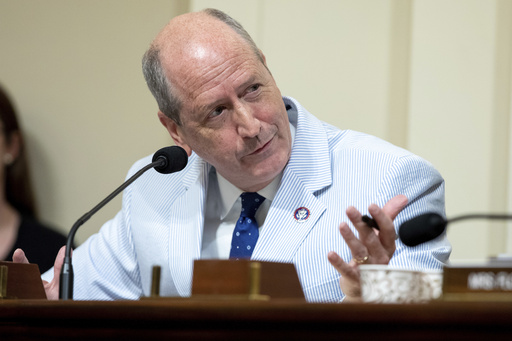
Two former members of Congress, both of whom have served in North Carolina’s state legislature, were in the running on Tuesday for the position of state attorney general, a highly monitored contest as this role has been gaining significance across various states in the nation.
Democratic U.S. Representative Jeff Jackson, a veteran of the Afghan war and attorney with the National Guard, was elected to Congress in 2022. On the other hand, Republican U.S. Representative Dan Bishop, who has extensive experience as a commercial litigation attorney and served as a county commissioner, entered Congress in 2019.
The victor will take over from Josh Stein, who has served two terms as attorney general and is now the Democratic candidate for governor. Notably, a Republican has not held the attorney general office since 1896, despite the party’s longstanding success in other statewide positions. This campaign is among the most closely observed of the ten attorney general races taking place nationwide.
The attorney general’s responsibilities encompass representing North Carolina in legal matters and supporting the locality-elected district attorneys during appeals of criminal cases. However, this position has gained heightened relevance recently within the ninth-largest state in the U.S. and across the nation, as attorneys general have increasingly collaborated—often along partisan lines—to combat what they describe as federal overreach.
Each candidate has criticized the other, branding him as too extreme for the office, while arguing that his own professional background best qualifies him for the role. Jackson highlights his prior experience as an assistant prosecutor in Gaston County, advocating for a nonpartisan approach to the job. Bishop, an avid supporter of former President Donald Trump, underscores his extensive courtroom experience, claiming to have appeared over 400 times in state and federal courts.
The offices of attorney general and governor comprise two of ten statewide executive roles that form North Carolina’s Council of State. Six of these positions witnessed a change of incumbents as they could not run for reelection this cycle. Democratic Governor Roy Cooper was unable to seek another term due to term limits.
The race for the successor to current Lt. Governor Mark Robinson, who is running for governor against Stein, featured Democratic state Senator Rachel Hunt and Republican Hal Weatherman, who previously served as a senior aide to Lt. Governor Dan Forest. Rachel Hunt is the daughter of former Governor Jim Hunt, who also held the position of lieutenant governor in the 1970s.
Additionally, various positions including state superintendent of public instruction, state treasurer, and labor commissioner were on the ballot.
Current Superintendent Catherine Truitt lost to Michele Morrow in the Republican primary, while GOP Treasurer Dale Folwell failed to secure his party’s gubernatorial nomination. The Republican Labor Commissioner Josh Dobson chose not to pursue re-election.
For the superintendent’s position, former Guilford County Schools Superintendent Mo Green, a Democrat, was in contention against Morrow. In the race for treasurer, Democratic state legislator and economic consultant Wesley Harris faced off against Republican Brad Briner, a former investment manager. The contest for the labor commissioner included Republican Luke Farley, an attorney, and Democrat Braxton Winston, who was previously a member of the Charlotte city council.
At the same time, among Council of State officers seeking to retain their positions, seven-term Secretary of State Elaine Marshall was contesting against Republican Chad Brown, chair of the Gaston County commissioners.
State Auditor Jessica Holmes, a Democrat appointed by Cooper last year after Beth Wood’s resignation, was pursuing a full four-year term against Republican Dave Boliek, who previously chaired the University of North Carolina at Chapel Hill’s Board of Trustees.
Republican Insurance Commissioner Mike Causey was aiming for a third term against Democratic state senator Natasha Marcus. Agriculture Commissioner Steve Troxler, a Republican in office since 2005, faced a rivalry from Democrat Sarah Taber, a farmer and agricultural consultant.
Voters across the state were also responsible for electing four appellate court judges, highlighted by a seat on the state Supreme Court. The incumbent, Democratic Associate Justice Allison Riggs, appointed by Cooper, aimed for an eight-year term against Republican Court of Appeals Judge Jefferson Griffin.
The statewide ballot further included a proposed amendment to the state constitution, which advocates assert clarifies that only U.S. citizens aged 18 and older, along with fulfilling other conditions, are permitted to vote in elections.

